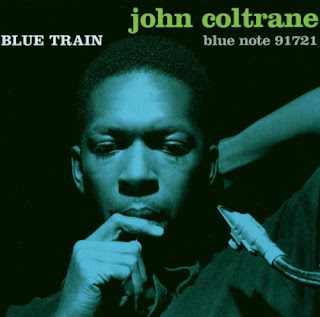For the rollout of "Tar Heel Nation" -- a specific new dimension for this website that will suddenly appear out of nowhere or perhaps periodically find its way through here for no apparent reason -- I've chosen one of my favorite musicians of all time in jazz, blues or any other style: John Coltrane (1926-1967).
Though born in Hamlet, North Carolina (scene of a terrible industrial plant fire in more recent years), John actually grew up in High Point, a city only about fifteen miles away from the bigger city of Greensboro. (High Point's population remained under 40,000 when John lived there, but now has more than 100,000).
"High Point . . . I spent 17 years there -- I went to all the schools, you know, grade school, elementary school and high school . . . My interest in jazz was started in high school. . . My family liked church music, so there was no jazz in the house . . . I didn't hear much jazz until I was 15. . ." (Coltrane on Coltrane, pages 61-62).
Much of his family was associated with the African Methodist Episcopal Church. In High Point, John's "mother played piano and sang, and his father [a tailor] played violin and ukulele . . . The repertoire Coltrane learned during this time included traditional black sacred music . . . popular music . . . and European concert music, primarily through records and radio . . . But it was black saxophonists that pulled his ear . . . (Brown, John Coltrane, pages 4-5).
Next stop: Philadelphia and the destiny of sainthood (literally, at least in the African Orthodox Church) -- but that's for another time and another place.
For more on John Coltrane's North Carolina roots, here's a link to the High Point Museum. Attention to his legacy has been on the upswing. There's now a statue honoring him in High Point. And let's not forget the John Coltrane International Jazz and Blues Festival, linked here.
Leonard L. Brown, ed., John Coltrane & Black America's Quest for Freedom: Spirituality and the Music (New York: Oxford University Press, 2010).
Chris DeVito, ed., Coltrane on Coltrane: The John Coltrane Interviews (Chicago: Chicago Review Press, 2010).
Today's Rune: Opening.
Though born in Hamlet, North Carolina (scene of a terrible industrial plant fire in more recent years), John actually grew up in High Point, a city only about fifteen miles away from the bigger city of Greensboro. (High Point's population remained under 40,000 when John lived there, but now has more than 100,000).
"High Point . . . I spent 17 years there -- I went to all the schools, you know, grade school, elementary school and high school . . . My interest in jazz was started in high school. . . My family liked church music, so there was no jazz in the house . . . I didn't hear much jazz until I was 15. . ." (Coltrane on Coltrane, pages 61-62).
Much of his family was associated with the African Methodist Episcopal Church. In High Point, John's "mother played piano and sang, and his father [a tailor] played violin and ukulele . . . The repertoire Coltrane learned during this time included traditional black sacred music . . . popular music . . . and European concert music, primarily through records and radio . . . But it was black saxophonists that pulled his ear . . . (Brown, John Coltrane, pages 4-5).
Next stop: Philadelphia and the destiny of sainthood (literally, at least in the African Orthodox Church) -- but that's for another time and another place.
For more on John Coltrane's North Carolina roots, here's a link to the High Point Museum. Attention to his legacy has been on the upswing. There's now a statue honoring him in High Point. And let's not forget the John Coltrane International Jazz and Blues Festival, linked here.
Leonard L. Brown, ed., John Coltrane & Black America's Quest for Freedom: Spirituality and the Music (New York: Oxford University Press, 2010).
Chris DeVito, ed., Coltrane on Coltrane: The John Coltrane Interviews (Chicago: Chicago Review Press, 2010).
Today's Rune: Opening.












2 comments:
Coltrane knew something no one else has yet figured out. Music is words writ large on the ears.
Another lacking in my education. I know very little about him.
Post a Comment